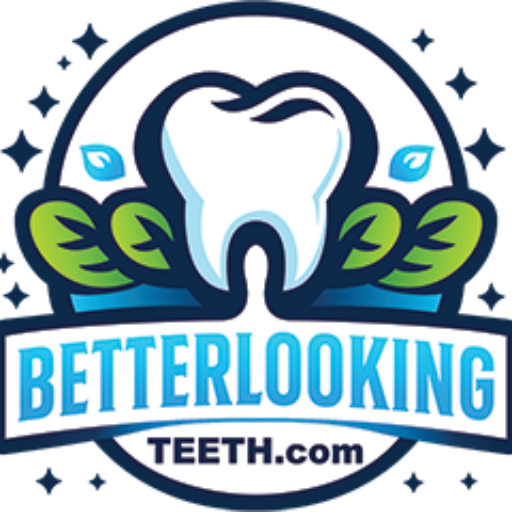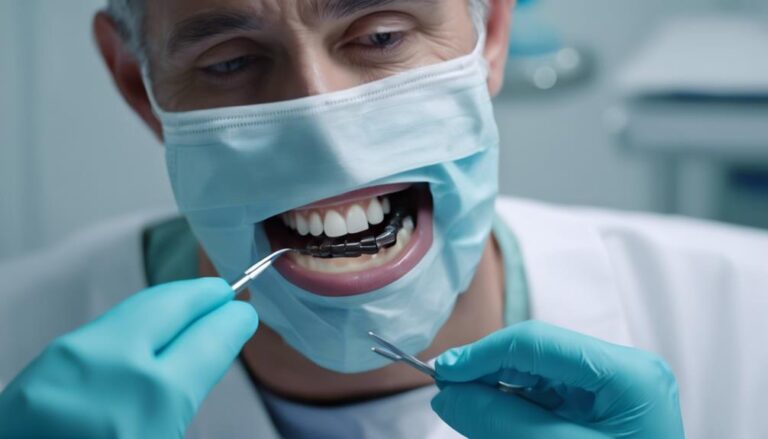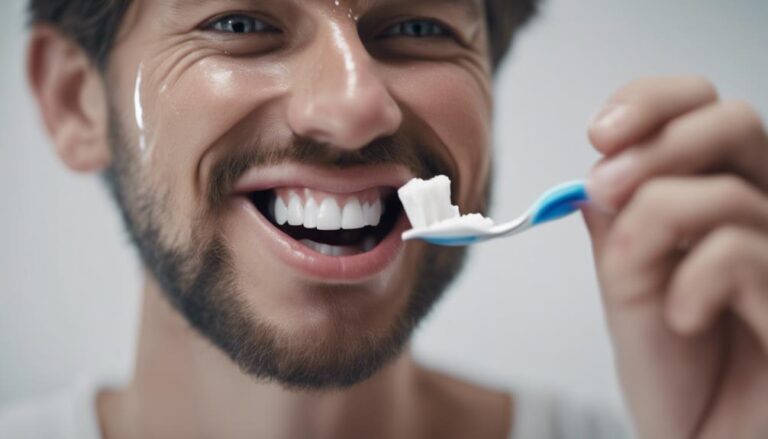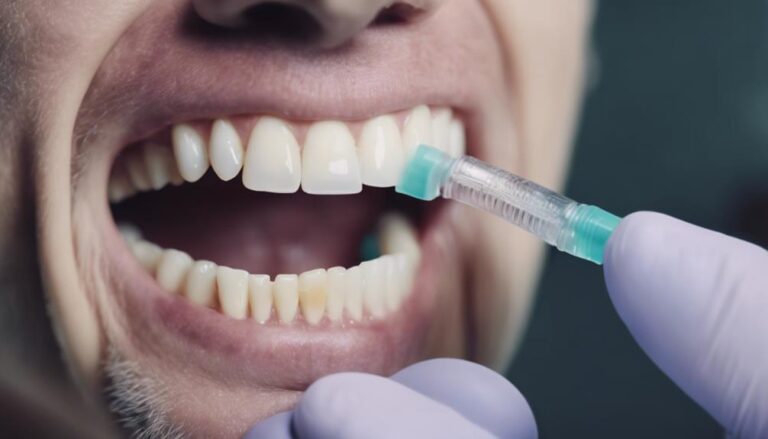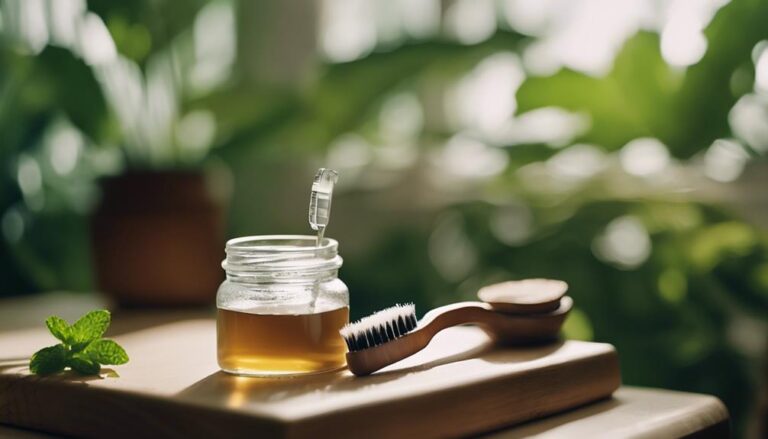When fighting gum disease and halitosis, effective treatments are essential. Regular brushing and flossing maintain gum health. Opt for mouthwashes to keep breath fresh. Don’t skip professional cleanings for overall oral wellness. Consider scaling and root planing for deep cleaning. Try aloe vera gel to soothe gum inflammation and tongue scraping for fresher breath. Explore gum massage techniques and stress management to aid healing. Remember, healthier gums and fresher breath are within reach with proven treatments.
Key Takeaways
- Regular professional dental cleanings and scaling can effectively combat gum disease.
- Antibacterial mouth rinses help eliminate bacteria causing gum disease and bad breath.
- Proper brushing and flossing techniques are crucial in preventing gum disease and halitosis.
- Herbal remedies like aloe vera can aid in reducing inflammation associated with gum disease.
- Stress management plays a significant role in preventing and treating gum disease and halitosis.
Brushing Techniques for Gum Health
Regularly brushing your teeth using proper techniques is essential for maintaining gum health and preventing gum disease. To promote gum health, incorporating gum massage into your brushing routine can be beneficial. Gently massaging your gums with a soft-bristled toothbrush in circular motions can help improve blood flow, reduce inflammation, and strengthen the gum tissue.
When it comes to brushing tips, it’s important to brush at least twice a day for two minutes each session. Use a pea-sized amount of fluoride toothpaste and hold your toothbrush at a 45-degree angle to the gums. Brush using gentle, short strokes, ensuring to clean the outer, inner, and chewing surfaces of your teeth. Pay extra attention to the gumline where plaque tends to accumulate. Remember to replace your toothbrush every three to four months or sooner if the bristles are frayed.
Flossing Methods for Oral Care
Flossing plays a vital role in maintaining excellent oral hygiene by effectively removing plaque and food particles from between teeth and along the gumline. When it comes to flossing methods for oral care, there are several techniques and tools that can enhance your routine:
- Flossing Hacks: Utilize flossing hacks like the ‘C’ shape method to guarantee proper cleaning between teeth.
- Interdental Brushes: These small brushes are excellent for cleaning hard-to-reach spaces between teeth.
- Water Flossers: Water flossers, also known as oral irrigators, use a stream of water to clean between teeth and along the gumline effectively.
- Oral Irrigators: These devices are beneficial for individuals with braces or dental work, as they can help remove debris that traditional floss might miss.
Incorporating these flossing methods into your oral care routine can greatly improve your gum health and overall oral hygiene.
Mouthwash Options for Fresh Breath
To further enhance oral hygiene beyond flossing methods, exploring different mouthwash options can be beneficial for maintaining fresh breath and overall oral health. Invigorating mouthwash options are popular for their revitalizing feel and ability to combat bad breath. Look for mouthwashes containing ingredients like menthol or peppermint for that stimulating sensation. Natural alternatives such as tea tree oil or aloe vera can also provide antibacterial properties while keeping your breath fresh.
For those looking to customize their oral care routine, DIY mouthwash recipes offer a fun and personalized approach. Ingredients like baking soda, essential oils, and even green tea can be mixed to create a homemade mouthwash tailored to your preferences. Additionally, alcohol-free options are gentler on sensitive gums and can be less harsh for those prone to dry mouth or oral irritations.
When selecting a mouthwash, consider your specific needs and preferences to find the best option for maintaining fresh breath and promoting overall oral health.
Professional Dental Cleanings Importance
Professional dental cleanings play a crucial role in maintaining excellent oral health and preventing potential issues such as gum disease and cavities. As a dental professional, I can’t stress enough the importance of regular cleanings as part of preventive measures to guarantee overall oral health.
Here are some key points to ponder:
- Plaque Removal: Professional cleanings effectively remove plaque buildup that regular brushing and flossing may miss, reducing the risk of gum disease.
- Tartar Removal: Tartar, or hardened plaque, can’t be removed at home and requires professional cleaning to prevent gum inflammation.
- Early Detection: Regular cleanings allow for the early detection of potential issues, enabling prompt intervention and preventing more severe problems.
- Polishing: Cleanings not only remove debris but also include polishing, enhancing the appearance of teeth and freshening breath.
These routine checkups may seem simple, but their long-term benefits are invaluable in maintaining a healthy smile and preventing costly dental procedures down the road.
Scaling and Root Planing Procedure
When addressing advanced gum disease, the scaling and root planing procedure becomes an essential treatment option to contemplate. This procedure, also known as deep cleaning, aims to remove plaque and tartar from below the gumline, targeting areas that regular cleanings can’t reach. Scaling involves scraping off the calculus from the teeth and roots, while root planing smooths out rough areas on the roots to prevent bacteria buildup. It is a non-surgical method that helps in treating gum disease and preventing its progression to more severe stages.
I have provided a table below to highlight key aspects of the scaling and root planing procedure:
| Scaling and Root Planing Procedure | |
|---|---|
| Purpose | Deep cleaning below the gumline |
| Benefits | Removal of plaque and tartar, prevention of gum disease progression |
| Techniques | Scaling (calculus removal), Root planing (root surface debridement) |
Periodontal maintenance is important post-procedure to ensure the gums heal properly and prevent reinfection. Root surface debridement during the process helps in promoting gum reattachment and overall oral health.
Antibacterial Mouth Rinse Benefits
Have you ever wondered how using an antibacterial mouth rinse can benefit your oral health? Antibacterial mouth rinses can be a valuable addition to your oral hygiene routine, offering several benefits:
- Kills Harmful Bacteria: Antibacterial mouth rinses are formulated to target and eliminate harmful bacteria in your mouth, reducing the risk of gum disease and cavities.
- Promotes Microbiome Balance: By targeting specific bacteria, these mouth rinses help maintain a healthy balance in your oral microbiome, essential for overall oral health.
- Freshens Breath: Many antibacterial rinses also contain ingredients that help freshen breath by reducing the bacteria that cause bad odors.
- Complements Natural Remedies: While antibacterial mouth rinses are effective, they can also be used in conjunction with natural remedies like oil pulling or herbal rinses for a holistic approach to oral health.
Incorporating an antibacterial mouth rinse into your daily routine can enhance your oral health by targeting harmful bacteria, promoting microbiome balance, freshening breath, and complementing natural remedies.
Gum Disease Laser Therapy
Utilizing advanced laser technology, gum disease laser therapy offers a minimally invasive and effective treatment option for combating periodontal disease. This innovative approach provides numerous benefits, including precision in targeting infected areas while leaving healthy tissue unharmed. The laser energy helps to remove bacteria and infected tissue, promoting gum tissue regeneration and reducing pocket depth, which is essential for halting the progression of gum disease.
One of the key advantages of gum disease laser therapy is its ability to minimize bleeding and swelling during and after the procedure, leading to a more comfortable experience for patients compared to traditional gum surgery. Additionally, the use of lasers can stimulate blood flow and collagen production, aiding in faster healing and recovery times. This advanced treatment option also reduces the need for anesthesia in many cases, making it a preferred choice for individuals seeking a more gentle approach to managing their periodontal health.
Oral Probiotics for Mouth Health
To enhance oral health, incorporating oral probiotics into your dental care routine can support a healthy mouth microbiome. Probiotic benefits extend beyond gut health; they play an important role in maintaining oral health too. Here are some key points to keep in mind when exploring the benefits of oral probiotics:
- Balancing Microbiome: Oral probiotics help balance the oral microbiome, reducing harmful bacteria that can lead to issues like gum disease and bad breath.
- Preventing Decay: By fostering a healthy environment in the mouth, probiotics can help prevent tooth decay and cavities.
- Fresh Breath: Maintaining a balanced oral microbiome can contribute to fresher breath by reducing the presence of odor-causing bacteria.
- Supporting Overall Health: The gut-brain connection influences mouth care, and oral probiotics can positively impact this relationship, potentially benefiting both oral and overall health.
Incorporating oral probiotics into your daily routine can be an important step towards improving your oral health and overall well-being.
Herbal Remedies for Bad Breath
Exploring natural herbal remedies can provide effective solutions for combating bad breath and maintaining oral freshness. Herbal teas are a popular choice for bad breath relief due to their natural properties that can help freshen breath. Peppermint tea, for example, contains menthol, which acts as a natural breath freshener. Green tea is another beneficial option as it contains polyphenols that can help reduce sulfur compounds in the mouth, which are often responsible for bad breath.
In addition to herbal teas, essential oils have been used for centuries in halitosis treatment. Oils such as peppermint, tea tree, and eucalyptus have antibacterial properties that can help kill odor-causing bacteria in the mouth. These essential oils can be diluted in water and used as a mouthwash or added to toothpaste for added freshness.
Nutritional Supplements for Oral Health
Nutritional supplements play a significant role in supporting overall oral health and can complement herbal remedies in combatting gum disease and halitosis effectively. When considering nutritional supplements for oral health, their efficacy and benefits should be carefully assessed. Here are four essential points to understand:
- Vitamin C: Known for its antioxidant properties, Vitamin C helps in maintaining healthy gums by supporting collagen production and fighting bacteria that cause gum disease.
- Vitamin D: This vitamin plays an important role in supporting oral health by aiding in the absorption of calcium, which is essential for strong teeth and bones.
- Omega-3 Fatty Acids: These healthy fats help reduce inflammation in the body, including the gums, and promote overall gum health.
- Probiotics: Beneficial bacteria found in probiotics can help balance the oral microbiome, reducing harmful bacteria that contribute to gum disease and bad breath.
Including these nutritional supplements in your daily routine can provide additional support to your oral health regimen, enhancing the effectiveness of your overall gum disease and halitosis treatment plan.
Oil Pulling Benefits for Gums
Implementing oil pulling as a natural oral hygiene practice can offer several benefits for gum health and overall oral hygiene. Oil pulling involves swishing a tablespoon of oil, typically coconut oil, in your mouth for about 15-20 minutes to remove bacteria and improve oral health. This ancient Ayurvedic technique is known for its antimicrobial properties, which can help combat gum disease and promote healthier gums.
| Benefits of Oil Pulling | Emotions Evoked |
|---|---|
| Reduces harmful bacteria in the mouth | Relief |
| Improves gum health by reducing inflammation | Comfort |
| Helps freshen breath and prevent halitosis | Confidence |
| Enhances overall oral hygiene | Satisfaction |
Additionally, incorporating essential oils like tea tree or peppermint oil into your oil pulling routine can further boost its effectiveness in maintaining excellent oral hygiene. Oil pulling, when done regularly as part of a thorough oral care routine, can contribute significantly to gum health and overall well-being.
Aloe Vera Gel for Gum Inflammation
To further enhance gum health and combat inflammation, consider utilizing aloe vera gel as a natural remedy. Aloe vera has been recognized for its beneficial properties in promoting oral health, especially in addressing gum inflammation.
Here are some key points to keep in mind when using aloe vera gel for gum health:
- Aloe Vera Benefits: Aloe vera contains anti-inflammatory and antimicrobial properties that can help reduce gum inflammation and fight bacteria in the mouth.
- Gum Inflammation Prevention: Regular use of aloe vera gel can aid in preventing gum inflammation by soothing the gums and promoting healing.
- Treatment of Gum Inflammation: Applying aloe vera gel directly to the affected areas can assist in reducing swelling and discomfort associated with gum inflammation.
- Side Effects: While aloe vera is generally safe for oral use, some individuals may experience minor allergic reactions. It’s advisable to do a patch test before widespread use.
Incorporating aloe vera gel into your oral care routine can be a natural and effective way to support gum health and combat inflammation.
Tongue Scraping for Fresh Breath
Consider integrating tongue scraping into your daily oral hygiene routine to maintain fresh breath and enhance overall oral health. Tongue scraping is a simple and effective practice that helps remove bacteria, food debris, and dead cells from the surface of the tongue. By cleaning the tongue regularly, you can help guarantee good breath and promote better tongue hygiene.
Bad breath, also known as halitosis, often originates from the bacteria that accumulate on the tongue. These bacteria can produce foul-smelling compounds, leading to unpleasant breath odor. Tongue scraping helps eliminate these odor-causing bacteria, resulting in fresher breath.
To perform tongue scraping, use a tongue scraper or a toothbrush with a tongue cleaner to gently scrape or brush the surface of the tongue from back to front. Repeat this process a few times to make sure thorough cleaning. Integrating tongue scraping into your daily routine, along with brushing and flossing, can greatly contribute to bad breath prevention and overall oral health.
Gum Massage Techniques for Healing
Exploring effective gum massage techniques can aid in the healing process and promote better gum health. When performed correctly, gum massage offers a range of benefits such as relaxation and accelerated healing. Here are some key points to keep in mind when incorporating gum massage into your oral care routine:
- Increased Circulation: Gentle massaging of the gums can improve blood flow to the area, facilitating healing and promoting overall gum health.
- Reduced Inflammation: By gently massaging the gums, you can help reduce inflammation and tenderness, leading to a healthier gum line.
- Stress Relief: Gum massage techniques not only benefit your oral health but can also provide a sense of relaxation and stress relief.
- Enhanced Effectiveness: Consistent practice of gum massage techniques can yield positive results for gum health and overall oral well-being.
Incorporating these techniques into your daily oral care routine can contribute to maintaining healthy gums and preventing gum disease.
Stress Management for Oral Well-being
Implementing stress management techniques is essential for maintaining excellent oral well-being. Stress can have a substantial impact on our oral health, leading to issues such as teeth grinding, jaw clenching, and gum disease. To combat these effects, incorporating practices like meditation relaxation and breathing exercises into your daily routine can be highly beneficial.
Meditation relaxation techniques help calm the mind and body, reducing overall stress levels that can contribute to oral health problems. By taking time to meditate, you can lower cortisol levels, which is a hormone associated with stress, and promote a sense of well-being that extends to your oral cavity.
Breathing exercises are another effective way to manage stress for better oral health. Deep breathing techniques can help relax tense muscles in the jaw and face, preventing conditions like bruxism. Additionally, proper breathing promotes oxygen flow throughout the body, aiding in the healing process of gum tissues and reducing inflammation.
Incorporating these stress management practices into your daily routine can greatly improve your oral well-being and contribute to a healthier smile.
Frequently Asked Questions
Can Genetics Play a Role in Developing Gum Disease and Halitosis?
Genetic predisposition can influence the likelihood of developing gum disease and halitosis. However, maintaining good oral hygiene practices, like regular brushing and flossing, can help mitigate these risks. Consistent care is key for oral health.
Are There Any Specific Foods to Avoid for Maintaining Oral Health?
To maintain excellent oral health, I recommend being mindful of dietary restrictions that can impact teeth and gums. Avoid sugary foods and acidic beverages. Pair this with diligent dental care, good oral hygiene, and healthy lifestyle choices.
How Can Smoking and Alcohol Consumption Impact Gum Health?
Indulging in smoking and alcohol can greatly impact gum health, leading to increased risk of gum disease. To prevent these issues, I focus on a healthier lifestyle, avoiding these habits for better oral well-being.
Is There a Connection Between Hormonal Changes and Gum Problems?
Ensuring good oral hygiene is crucial during these times to prevent potential issues, as hormonal changes like pregnancy, puberty, or menopause can impact gum health. Hormonal imbalance may lead to an increased risk of gum disease.
Can Certain Medications Contribute to Bad Breath and Gum Disease?
Certain medications can contribute to bad breath and gum disease due to their side effects. It’s essential to maintain good oral hygiene habits like regular brushing and flossing to mitigate these effects and keep oral health in check.
Conclusion
To sum up, taking care of your gums and breath is like tending to a garden – it requires consistent effort and attention.
By implementing proven treatments such as proper brushing techniques, regular flossing, and professional cleanings, you can maintain a healthy mouth and fresh breath.
Remember, just like a well-tended garden blossoms with beauty, your oral health will flourish with the right care. Stay committed to these practices for a brighter, healthier smile.
